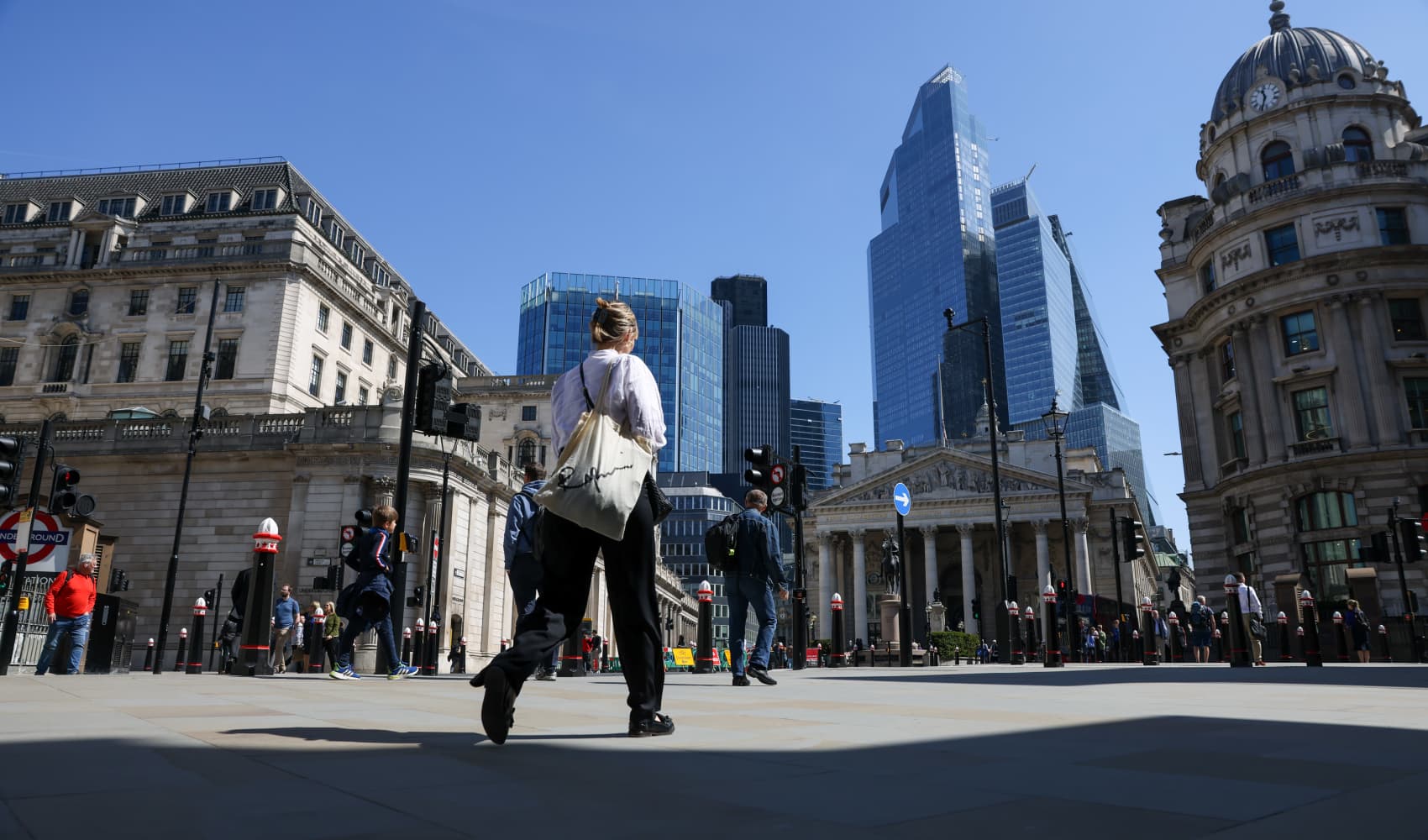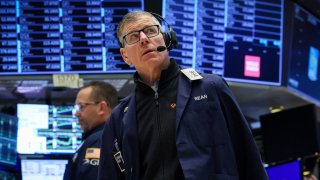
Stocks tanked on Wednesday after March inflation data came in hotter than expected, likely pushing off interest rate cuts by the Federal Reserve that investors have been anticipating.
Investor sentiment was further dampened following the release of March's Fed meeting minutes, which reflected officials' concerns that inflation isn't moving quickly enough toward the central bank's 2% target.
The Dow Jones Industrial Average dropped 422.16 points, or 1.09%, to end at 38,461.51. The S&P 500 slid 0.95% to 5,160.64. Nasdaq Composite tumbled 0.84% to close at 16,170.36.
With the exception of energy, all sectors in the broad market index were negative on the session. Real estate fell 4.1%, leading sector losses for the day. The S&P 500 had been treading water in April in anticipation of this inflation report following a roaring start to the year in which the benchmark rallied more than 10%, its best first-quarter gain in five years.
Get San Diego local news, weather forecasts, sports and lifestyle stories to your inbox. Sign up for NBC San Diego newsletters.
The CPI in March rose 0.4% for the month and 3.5% year over year, versus estimates for a 0.3% monthly increase and 3.4% from 12 months earlier, according to economists polled by Dow Jones. Core CPI, which excludes volatile food and energy prices, accelerated 0.4% from the previous month while rising 3.8% from a year ago, compared to estimates for 0.3% and 3.7%, respectively.
Fed funds futures trading data now suggests just a 17% likelihood that the Fed will lower rates at its June meeting, according to the CME FedWatch Tool. Traders are now betting that the first rate cut will likely take place at the central bank's meeting in September.
The 10-year Treasury yield, a benchmark for mortgage and other loans, soared back above 4.5% following the inflation report. The 2-year Treasury yield spiked to nearly 5%.
Money Report
Bank shares and industrial shares declined — with JPMorgan Chase dipping around 0.9% and Honeywell losing 1.4% — on worries higher rates will start to suffocate the economy. Once red-hot tech stocks Microsoft and Apple also pulled back 0.7% and 1.1%, respectively. Small-cap benchmark Russell 2000 dropped 2.5%.
"As we continue to see multiple reports in a row that are higher-than-expected, it becomes more difficult for the Fed to advocate cutting rates any time soon," said Chris Zaccarelli, Independent Advisor Alliance chief investment officer.
Although the markets have managed to shake off January and February's hot inflation data, signs of persistently higher prices are fueling Wednesday's downturn, according to Eric Diton, president and managing director of The Wealth Alliance.
"This is as good a catalyst as any. I don't think this is the end of the bull market. But I do think it's an excuse for a lot of people who have had a lot of gains, to take some of those gains off the table," Diton said.
Stocks close lower Wednesday
U.S. stocks ended Wednesday's trading session in the red.
The Dow Jones Industrial Average declined 422.16 points, or 1.09%.
The S&P 500 and Nasdaq Composite fell 0.95% and 0.84%, respectively.
— Hakyung Kim
Dollar rises to highest level against the yen since mid-1990
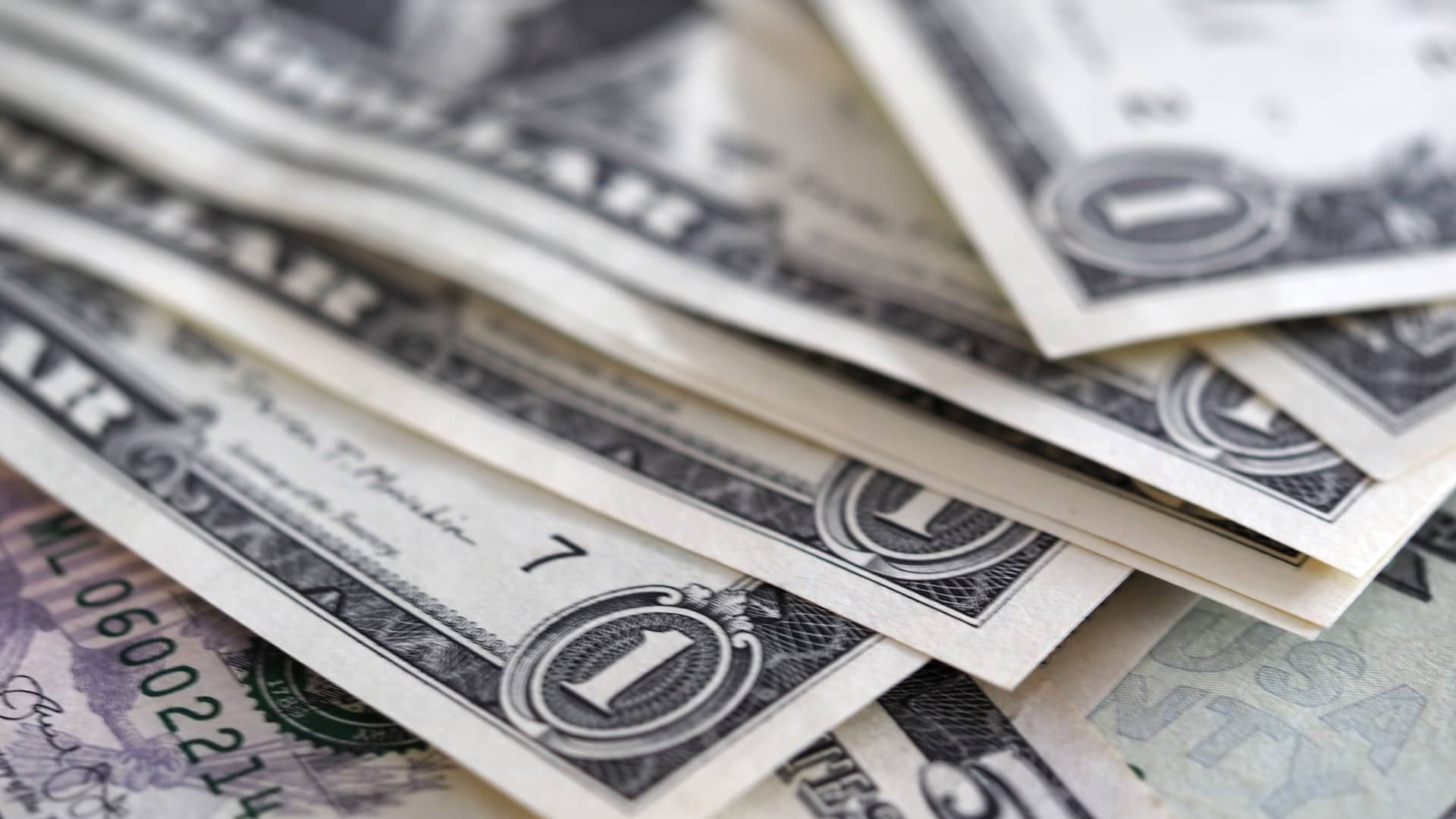
The U.S. Dollar rose broadly Wednesday following March's hotter than expected inflation reading, sending the dollar to its highest level against the Japanese yen since mid-1990.
The dollar index, which measures the greenback's value against six major currencies, was up 1.1% at 105.22. Against the yen, the dollar was last 0.7% higher at 152.895 yen, having touched 152.95, the highest point since mid-1990.
— Hakyung Kim, Reuters
Home Depot, Intel lead Dow losses
Home Depot and Intel fell more than 3% Wednesday, leading the Dow Jones Industrial Average's losses for the day.
The only positive stocks in the index were Procter & Gamble and Chevron, up 0.1% and 0.3% each, as well as Walmart higher by around 1%.
— Hakyung Kim
Energy sector bucks broader market Wednesday

Energy was the only sector in the green on Wednesday, rising 0.4%.
Marathon Oil, Pioneer Natural Resources and Coterra Energy also gained 1% or more.
Oil prices have climbed higher in recent weeks due to geopolitical risks and stockpile concerns. Meanwhile, crude oil futures dipped Wednesday following a slight increase in U.S. commercial crude stockpiles.
— Hakyung Kim
Here's what CIOs and markets strategists have to say about the CPI report:
A hotter-than-expected print on the consumer price index for March has led several investors to take a more bearish stance on the Federal Reserve's rate-cutting timeline. Results from companies' first-quarter earnings will be a key indication about the market's direction after its strong rally over the past year, some investors and strategists said.
Take a look at what some of them had to say:
- Seema Shah, chief global strategist at Principal Asset Management: "Today's crucial CPI print has likely sealed the fate for the June FOMC meeting with a cut now very unlikely...even if inflation were to cool next month to a more comfortable reading, there is likely sufficient caution within the Fed now to mean that a July cut may also be a stretch, by which point the U.S. election will begin to intrude with Fed decision making."
- John Lynch, chief investment officer for Comerica Wealth Management: "Equity indexes are increasingly dependent on the upcoming earnings season, as companies must deliver to substantiate higher valuations. Any profit disappointment likely brings the possibility of a near-term correction in the 5-6% range for the S&P 500 Index."
- Sonu Varghese, global macro strategist at Carson Group: "This pushes out the timing of the first rate cut because labor markets and the economy are strong, and now there's less urgency to cut."
- Rick Rieder, BlackRock's chief investment officer of global fixed income: "The world has clearly shifted to services, and particularly experiential, consumption...You can see that same dynamic in the amazing prices people are willing to pay to be at events, and/or together with other people, and consequently, we see in today's data services inflation remaining sticky," he said. "A key factor to understand here, is that many of these areas are not very interest rate sensitive, and thus the Fed has a very hard task in bringing down these price levels through the blunt tool of policy rates...it's probable that cuts will be pushed off until late in the year, or beyond."
— Pia Singh
Piper Sandler predicts how markets could react to a Biden win
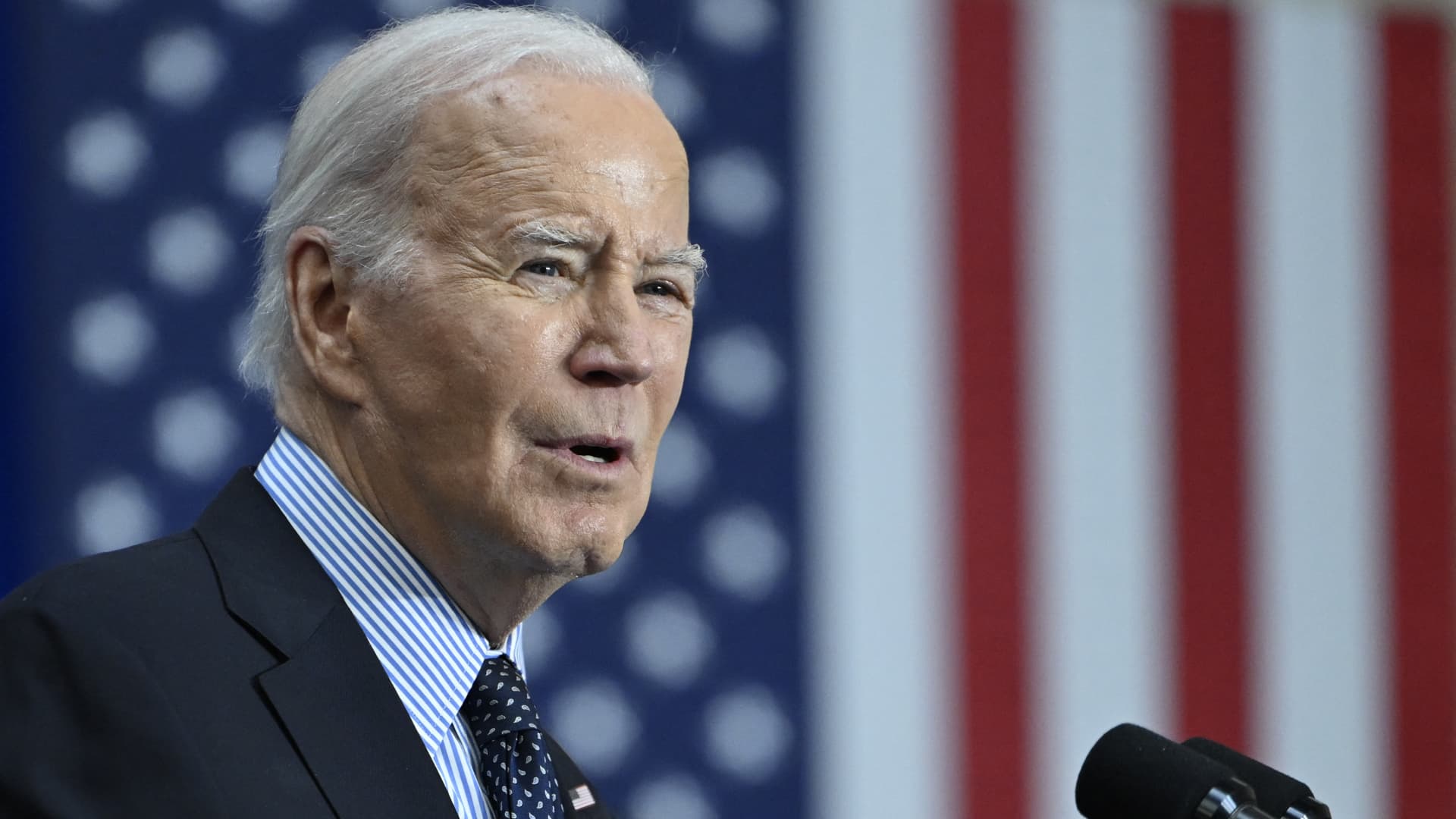
With this year's presidential election on the horizon, Piper Sandler released its prediction of how the market might react if President Joe Biden wins again.
"Estimates rest on adorable assumptions and imperfect if not dodgy measures. Still, a few estimated relations between a measure of Biden's perceived chances ... broadly follow intuition and give us bearings," wrote analyst Benson Durham.
For starters, Durham believes that the U.S. Treasury curve will flatten. On the equity side, the analyst predicts that the S&P 500 would climb 4.6%, while it would only climb 3.1% if Biden loses. In currencies, Durham believes that the U.S. dollar would weaken versus the other major currencies.
— Lisa Kailai Han
Inflation has taken 'two steps forward, two steps back,' says Comerica
March's CPI report indicated that inflation, particularly that of services prices, remains sticky despite the Federal Reserve's efforts. Inflation for the price of services, excluding energy and housing, has persisted "well above" pre-pandemic levels, and actually ticked higher in 2024, said Comerica chief economist Bill Adams.
"Service providers who tend to change prices less frequently, like insurers and healthcare providers, have made big price increases in recent months to pass on higher operating costs. That is contributing to the stickiness of inflation in the first half of 2024," Adams said.
Adams noted that labor-intensive services, such as in-home eldercare, is also higher than the Fed's 2% target due to worker shortages.
"In short, progress toward the Fed's 2% inflation target took a step back in the first quarter after two steps forward in the second half of 2024," he added.
— Hakyung Kim
7 S&P 500 stocks hit new 52-week lows
The major stock averages declined on Wednesday, after March's consumer price index exceeded economists' expectations.
During Wednesday's session, seven S&P 500 stocks hit their new 52-week lows. Here are the stocks that hit this milestone:
- Charter Communications trading at lows not seen since June, 2018
- Starbucks trading at lows not seen since Nov, 2022
- Brown-Forman trading at lows not seen since Mar, 2020
- Walgreens Boots Alliance trading at lows not seen since June, 1998
- Biogen trading at lows not seen since Sept, 2022
- Gilead Sciences trading at lows not seen since Oct, 2022
- Boeing trading at lows not seen since Dec, 2022
— Lisa Kailai Han, Christopher Hayes
Stocks making the biggest moves midday: Cava, Nvidia, Deckers, Block and more

Check out the companies making headlines in midday trading.
- Deckers Outdoor — Shares lost 6.9% after Truist downgraded the footwear company to hold over concerns that demand for core products is declining, noting softened direct-to-consumer trends for Hoka in February.
- Cava — Shares jumped 4.4% after Argus upgraded the Mediterranean food chain to buy from hold, saying investors should buy the dip. Cava has a "long runway to growth," the firm said. Shares are up 44% year to date, but they have dropped 11% this month.
- Nvidia — Shares rose 1.7% as the "Magnificent Seven" leader tried to claw its way out of correction territory. The stock is 11% below a record highs reached earlier this year.
For more, read here.
— Pia Singh
Real estate sector drops 4%, drags S&P 500
Real estate was the worst-performing sector in the S&P 500 during Wednesday's session, shedding more than 4% during midday trading.
Extra Space Storage and Public Storage were the biggest laggards in the sector, diving more than 6% each. Prologis, Boston Properties, American Tower Corporation and CoStar Group all fell at least 5%.
Host Hotels & Resorts shares experienced the smallest losses of the group, declining 1.5%.
— Samantha Subin
Homebuilders fall following hot inflation numbers
The iShares U.S. Home Construction ETF (ITB) fell 3.4% Wednesday following March's hotter-than-expected CPI report.
Following the release of the inflation numbers, traders lowered their expectations for the Federal Reserve to cut interest rates at its June meeting. The likelihood of "higher-for-longer" cost of borrowing has pressured the rate-sensitive homebuilding sector.
— Hakyung Kim
Currency markets could see volatility from continued high rates, says economist
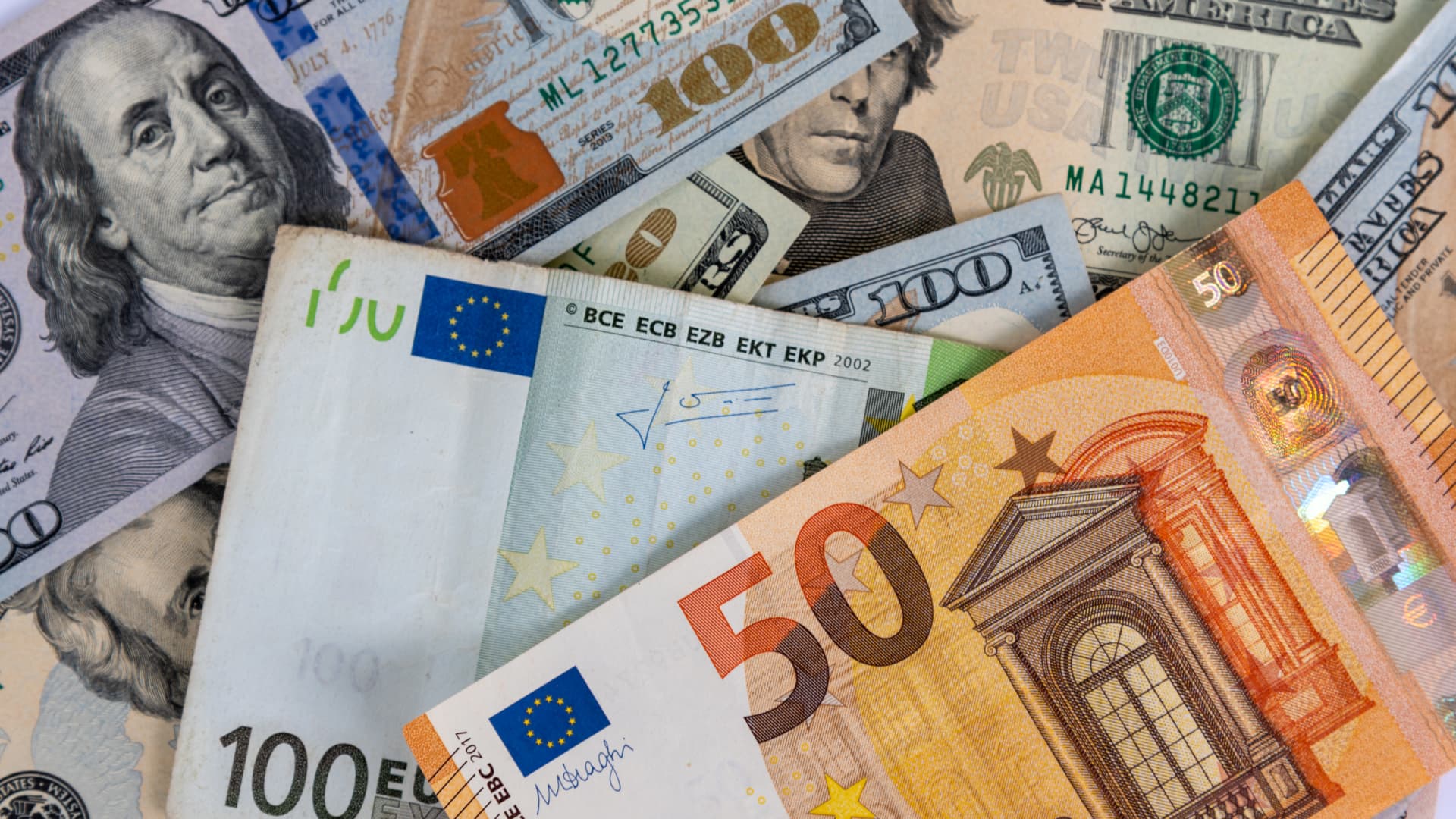
March's higher-than-expected inflation reading is reducing investors' expectations for the number of interest rate cuts this year from the Federal Reserve. With the cost of borrowing expected to stay higher for longer, this could lead to some big moves in foreign exchange markets, according to LPL Financial chief economist Jeffrey Roach.
"The gold market is telling investors that inflation pressures could linger longer than the Federal Reserve would want," said Roach.
"Should the Fed get backed into a corner and hold rates steady longer than expected, we should expect some volatility in the currency markets, especially if the ECB cuts rates this summer and Japan intervenes with their currency," Roach added.
— Hakyung Kim
Wall Street's 'fear index' signals more volatility ahead by making successive higher highs
Wall Street sees more price swings coming in the days and weeks ahead than in the recent past, according to the Chicago Board Options Exchange Volatility Index, or VIX, known as a yardstick of investor skittishness.
Sometimes called the "fear index," the VIX opened higher and was recently more than 9% above Tuesday's close after touching an intraday high of 16.43. In fact, Wednesday was the fifth straight day the intraday high in the VIX was above 16, a level last reached briefly more than four weeks ago, on March 11.
The last time the VIX was at levels higher than today was in early November and late October, just as the current stock market rally was getting underway. The intraday high in the VIX reached during the selloff in stocks late last week, for example, was the highest since November 1, 2023.
— Scott Schnipper
Nvidia adds 1%, bucks Wednesday's selloff
Nvidia shares rose 1% during early-morning trading, bucking the broader selloff trend.
The uptrend in Nvidia came as the major indexes hit selloff mode and fell more than 1% each. Nvidia was the only "Magnificent 7" stock in the green during Wednesday's session. Tesla led the group to the downside, falling about 3%.
— Samantha Subin
Oil prices hold near five-month highs after Israel threatens to strike Iran if attacked
Crude oil futures held near five-month highs on Wednesday after Israel threatened to attack Iran if the Islamic Republic strikes Israel directly.
The West Texas Intermediate contract for May delivery gained 48 cents, or 0.56%, to $85.71 a barrel. June Brent futures added 48 cents, or 0.54%, to $89.90 a barrel.
"If Iran attacks from its territory, Israel will react and attack Iran," Israeli Foreign Minister Israel Katz said on the social media platform X, tagging Supreme Leader Ayatollah Ali Khamenei.
Oil prices haven fallen more than 1% this week as investors booked profits after last week's rally. U.S. crude and the global benchmark have gained nearly 20% and 17%, respectively, this year as geopolitical tensions mount against the backdrop of a tightening global crude market.
— Spencer Kimball
Stocks open lower Wednesday
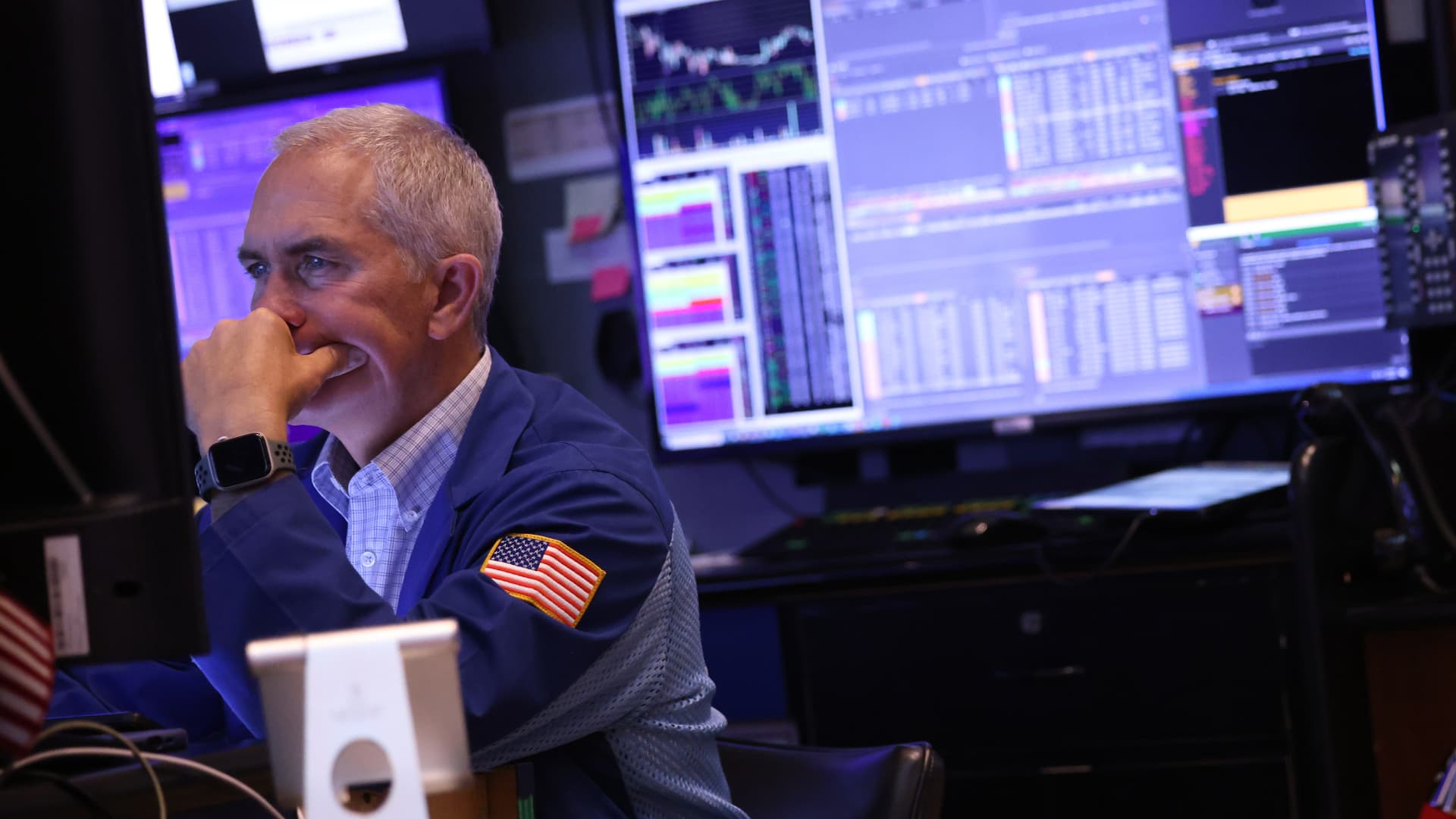
U.S. stocks started Wednesday's trading session in the red.
The Dow tumbled 400 points, or 1%. The S&P 500 and Nasdaq Composite lost 1.2% and 1.3%, respectively.
— Hakyung Kim
Tech stocks slump in premarket trading
Shares of tech stocks slid in premarket trading Wednesday. Nvidia dipped 2%, while Meta shed 1.6% and Alphabet and Microsoft each lost more than 0.5%.
These names were among the top performer's in the last year as investors raked up shares of highly-valued tech stocks on the hopes that the Federal Reserve would begin cutting interest rates, as rising rates tend to be negative for tech stocks.
— Pia Singh
Industrial stocks fall on rate fears

Shares of several industrial and cyclical names fell amid concerns that higher rates for longer will slow down the economy.
Deere, Caterpillar and Eaton were all down about 2% in premarket trading.
Meanwhile, the Industrial Select Sector SPDR Fund, which tracks the sector, slipped 1.3%.
— Michelle Fox
Stocks making the biggest moves premarket
Check out some of the companies making headlines in premarket trading.
- Nvidia — Stock in the chipmaker slipped less than 1% before the opening bell, but the artificial intelligence play and "Magnificent Seven" leader officially entered correction territory on Tuesday. Shares have fallen 10% from an all-time closing high of $950 per share on March 25.
- Alibaba Group — The China-based e-commerce stock rose nearly 3% on media reports that co-founder Jack Ma touted the company's management in an internal memo to employees. Ma's upbeat note also talked about the potential for AI.
- Albemarle — Shares gained about 2% after Bank of America upgraded the chemicals manufacturing company to buy on the back of rising lithium prices, and raised its price target.
Read the full list here.
— Brian Evans
CPI rises more than expected in March
A key U.S. inflation metric came in hotter than expected, raising concern that the Federal Reserve may not cut interest rates this year.
The consumer price index rose 0.4% in March from the prior month. Year over year, it gained 3.5%. Economists polled by Dow Jones expected a 0.3% gain month over month and a 3.4% increase year on year.
The March CPI increase was a reacceleration from February, when it gained 3.2%.
Core CPI, which strips out volatile food and energy prices, also rose more than expected last month.
— Fred Imbert
Bridgewater's Bob Prince says the Fed is 'off track'
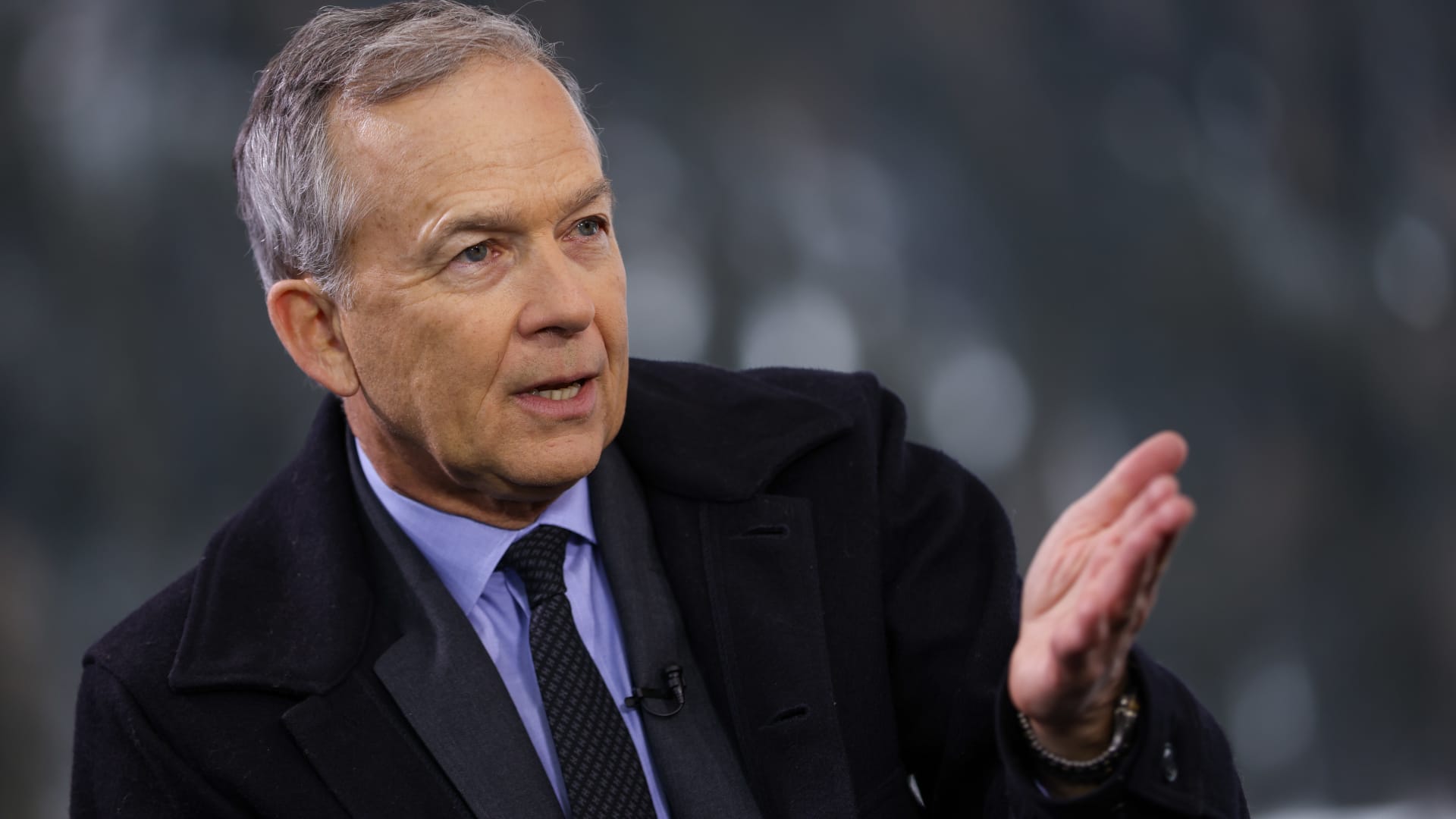
The Federal Reserve may not be able to cut interest rates as it intended to amid stubborn inflation and hot growth in the U.S., Bob Prince, Bridgewater's co-chief investment officer, told the Financial Times Tuesday.
"So far, this year is not transpiring the way that the Fed — or interest rate markets — have described. I think it is clear the Fed is off-track now. The question is how far off track," he said in the interview with the paper.
Because Prince expects rates to stay elevated for the time being, he said he saw "no reason to move out of cash into longer-term bonds at the moment."
— Click here to read the FT story.
— Yun Li
Aluminum reaches highest level in over a year

LME Aluminum hit 2,488 per metric ton Wednesday morning, the highest level since Feb. 10, 2023, when it traded as high as $2,504.
Prices have climbed on continued supply concerns as aluminum usage is expected to grow with use in solar power and wind turbines. U.S. production has fallen from 3.8M metric tons in 1999, to 785,000 tons in 2023.
LME Tin also reached a high of $33,130 per metric ton, the highest level since Jun. 16, 2022, when it traded as high as $33,400.
— Hakyung Kim
Delta pops on strong earnings
Delta shares were up more than 2% on the back of first-quarter earnings that beat analyst expectations.
The airline earned an adjusted 45 cents per share, topping an LSEG forecast of 36 cents per share. Revenue came in line at $12.56 billion. The company also reiterated its full-year earnings guidance.
— Fred Imbert
Europe stocks open higher
European stocks opened higher Wednesday, with the Stoxx 600 index up 0.6% at 8:20 a.m. London time and all sectors in the green.
Germany's DAX and the U.K.'s FTSE 100 were both around 0.6% higher, while France's CAC 40 climbed 0.5%.
— Jenni Reid
Fitch downgrades outlook on China to 'negative', affirms A+ rating
Ratings agency Fitch revised its outlook on China to "negative" from "stable," citing "increasing risks to China's public finance outlook."
The agency said in its report that the country faces more uncertain economic prospects and a transition away from property reliant growth.
Furthermore, it noted that wide fiscal deficits and rising government debt in recent years have eroded fiscal buffers, and that debt could still increase as fiscal policy increasingly plays an important role in supporting growth in the coming years.
However, Fitch affirmed its A+ rating on China, citing supporting factors including its large and diversified economy, solid GDP growth prospects relative to peers and an integral role in global goods trade.
— Lim Hui Jie
NetEase and Microsoft to bring games back to China
Chinese internet technology giant NetEase has teamed up with Microsoft to bring back games by Blizzard Entertainment to the world's second-largest economy.
The move comes after the partnership between the two companies was terminated in 2023 by Blizzard, citing disagreement over intellectual property control.
The press release states that the renewed publishing agreement will encompass games Chinese players had access to under the previous agreement, including World of Warcraft and Overwatch.
Separately, Microsoft and NetEase have also entered into an agreement to explore bringing new NetEase titles to Xbox consoles and other platforms.
— Lim Hui Jie
Japan's corporate inflation climbs to 0.8% in March, in line with expectations
Japan's corporate goods price index rose 0.8% in March from a year ago, accelerating from the revised 0.7% increase in February and in line with expectations from economists polled by Reuters.
This is also the third straight month that the corporate inflation rate has increased.
On a month on month basis, the CGPI climbed 0.2%, slightly lower than Reuters expectations of a 0.3% increase.
The CGPI measures the price changes of goods traded within the corporate sector.
— Lim Hui Jie
PriceSmart, WD-40 among stocks moving in extended trading
Check out some of the names making headlines in after-hours trading Tuesday:
- PriceSmart shares gained 3.2% after beating second-quarter estimates. The company, which operates U.S.-style membership shopping warehouse clubs in Latin America and the Caribbean, reported $1.31 in adjusted earnings per share on revenue of $1.29 billion. Analysts surveyed by FactSet had expected $1.24 in earnings, excluding items, on revenue of $1.29B for the quarterly period.
- SMART Global Holdings shares slid 7% after disappointing on second-quarter revenue expectations, posting $284.8 million in earnings while analysts polled by FactSet had called for $285.1 million. The memory and storage solutions provider reported earnings of 27 cents per share, excluding items, while analysts polled by FactSet had called for 25 cents per share in earnings.
- WD-40 shares edged lower by 0.5% after falling short of analysts' revenue forecast for the second quarter. The company beat on earnings, but posted $139.1 million in quarterly revenue, while analysts surveyed by FactSet had called for $140.5 million.
— Pia Singh
Stock futures open in the green on Tuesday
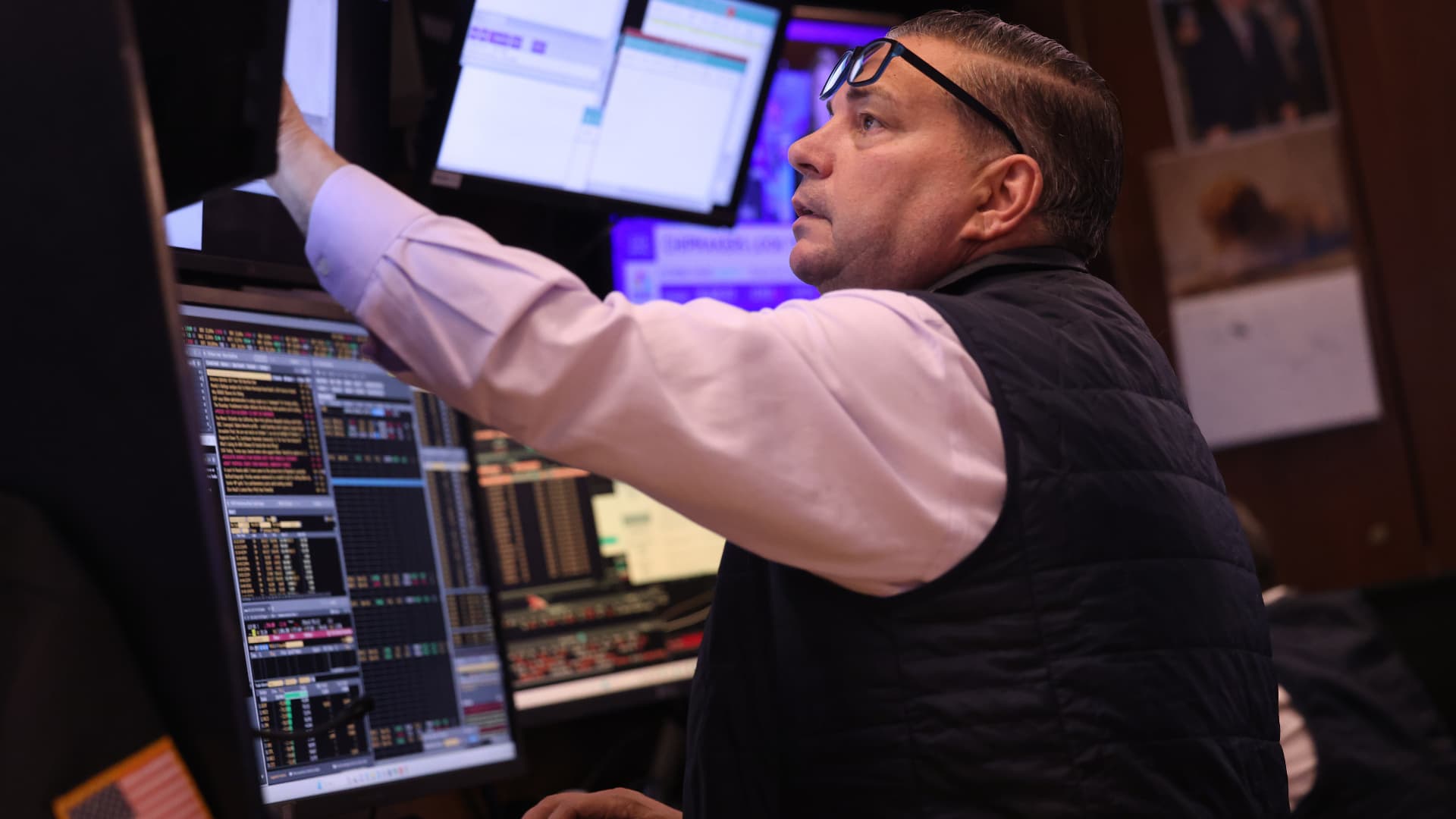
Stock futures were slightly higher after 6 p.m. ET Tuesday evening. Futures tied to the S&P 500 and Nasdaq 100 futures each rose 0.1%, while Dow Jones Industrial Average futures ticked up 30 points, or nearly 0.1%.
— Pia Singh



